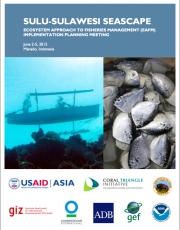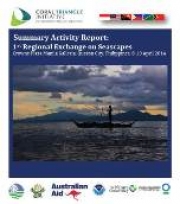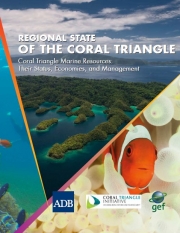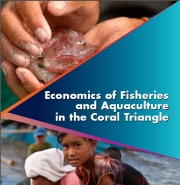How Are Our MPAs Doing? Challenges in Assessing Global Patterns in Marine Protected Area Performance
| # | Documents | Filesize |
|---|
Without effective management, protected areas are unlikely to achieve the high expectations the conservation and development sectors have for them: conserving biodiversity and alleviating poverty.
The Coral Triangle Marine Protected Area System aspires to become a region-wide, comprehensive, ecologically representative and well-managed system of marine protected areas (MPAs) and MPA networks. The development of this system will proceed primarily through the implementation of ecological, social, and governance MPA networks at the sub-national scale.
- Subject:
- Marine Protected Areas
- Type:
- Reports and Studies
- Country:
- Indonesia |
- Philippines |
- Solomon Islands |
- Malaysia |
- Papua New Guinea |
- Timor-Leste
| # | Documents | Filesize |
|---|---|---|
| 1 | 713,084 KB |
| # | Documents | Filesize |
|---|
The report highlight the activities and results generated from a 2-day workshop on Branding and Communication Workshop.
It also portrayed the goal of communication activties in 2016.
- Subject:
- Training and Development
- Type:
- Reports and Studies
- Country:
- Indonesia |
- Philippines |
- Solomon Islands |
- Malaysia |
- Papua New Guinea |
- Timor-Leste |
- Australia |
- Brunei
| # | Documents | Filesize |
|---|

The 4-day Sulu-Sulawesi Seascape Ecosystem Approach to Fisheries Management (EAFM)
Implementation Planning Meeting was the first multi-national meeting in the Coral Triangle (CT)
region aimed at developing operational plans to implement transboundary EAFM. The meeting
was supported by the Coral Triangle Initiative on Coral Reefs, Fisheries and Food Security
| # | Documents | Filesize |
|---|

- Subject:
- Seascapes
- Type:
- Reports and Studies
The First Regional Exchange on Seascapes aimed at fostering common and shared understanding of an integrated ecosystem-based management of oceans and coastal areas and progress towards a seascape approach in the six member countries of the Coral Triangle Initiative on Coral Reefs, Fisheries and Food Security (CTI-CFF), which includes Indonesia, Malaysia, Papua New Guinea (PNG), Philippines, Solomon Islands and Timor-Leste.
| # | Documents | Filesize |
|---|

- Subject:
- Monitoring and Evaluation
- Type:
- Reports and Studies
- Country:
- Indonesia |
- Philippines |
- Solomon Islands |
- Malaysia |
- Papua New Guinea |
- Timor-Leste
The Monitoring and Evaluation System (M&E System) Operation Manual has been developed as a guide for the Regional Secretariat, the Technical Working Groups (TWGs), the National Coordinating Committees (NCCs) and the implementing partners of the Coral Triangle Initiative on Coral Reefs, Fisheries and Food Security (CTI-CFF).
| # | Documents | Filesize |
|---|
The Coral Triangle covers an area between the Indian and Pacific oceans that represents the global epicenter of abundant marine life and diversity. The region surrounding these oceans includes some or all of the land and seas of six countries—Indonesia, Malaysia, Papua New Guinea, the Philippines, Solomon Islands, and Timor-Leste. The State of the Coral Triangle Reports provide general information on the status of biophysical characteristics; governance; socioeconomic characteristics; and threats to, and vulnerabilities of, the coral reef ecosystems of these six countries.
- Subject:
- Knowledge Management
- Type:
- Reports and Studies
- Country:
- Indonesia |
- Philippines |
- Solomon Islands |
- Malaysia |
- Papua New Guinea |
- Timor-Leste
| # | Documents | Filesize |
|---|

- Type:
- Reports and Studies
The Regional State of the Coral Triangle (RSCT) provides benchmarks on the biophysical, governance, and socioeconomic attributes of the six Coral Triangle countries, also known as CT6 - Indonesia, Malaysia, Papua New Guinea (PNG), the Philippines, Solomon Islands, and Timor-Leste—and the threats, vulnerabilities, and emerging issues in each country and in the CT6 as a collective unit.
| # | Documents | Filesize |
|---|

- Subject:
- Knowledge Management
- Type:
- Reports and Studies
- Country:
- Indonesia |
- Philippines |
- Solomon Islands |
- Malaysia |
- Papua New Guinea |
- Timor-Leste
The Economics of Fisheries and Aquaculture in the Coral Triangle (EFACT) is the first report of its kind that consolidates primary and secondary information on fisheries and aquaculture using a regional lens and analytical tools from economics. The EFACT is an output of the Asian Development Bank (ADB) technical assistance—Regional Cooperation on Knowledge Management, Policy, and Institutional Support to the Coral Triangle Initiative (CTI).
